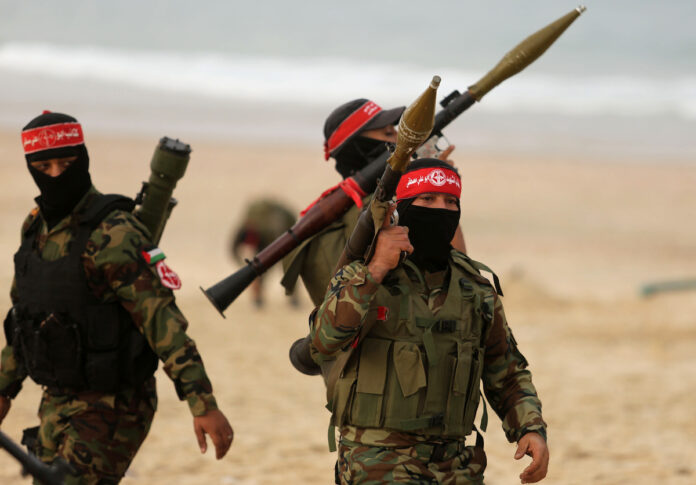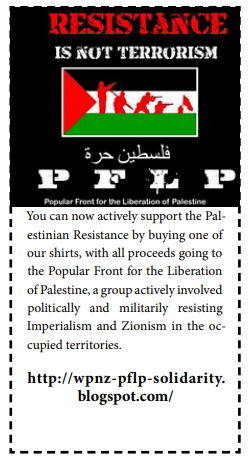
Juliet Moses is the spokesperson for the New Zealand Jewish Council and an Auckland based lawyer. This was first published on Plainsight.nz
A few days ago, I released a piece on self-declared extremism expert Byron Clark that talked about his connections to the PFLP, a Palestinian terror group responsible for untold civilian deaths in Israel and elsewhere.
Clark was a prominent member of the Workers Party – a socialist activist group – that raised money for the PFLP through the sale of T-shirts with ‘Resistance Is Not Terrorism’ emblazoned across them.
I was compelled to write the piece because the mainstream media have completely ignored this aspect of Clark’s history. Either they don’t know about it or don’t care, both unforgivable and disturbing positions.
Some supporters of Clark took exception to my piece pointing to a passage in his new book ‘Fear’ in which they feel he adequately addresses the charge, putting it to bed.
But his explanation, which I will repost here in full, is designed to deceive.
“As I young man I believed, incorrectly, that the group had put down their weapons and joined the peaceful political process, like the ANC in South Africa or Sinn Fein in Ireland. As far as I’m aware, not only did the Palestinian group never actually receive any money but also the New Zealand state never attempted to challenge the fundraiser, making the whole exercise futile. This hasn’t stopped members of New Zealand’s far-Right, who found an advertisement for the fundraiser in the group’s magazine The Spark (specifically, in the first episode that I edited), claiming I give money to terrorists.“
Byron Clark
In this, and the preceding text, Clark does appear to exhibit self-reflection, using his own story to illustrate how young men can fall down the rabbit hole of extremism. One of his sources of regret, it seems, is thinking he was supporting a peaceful group that unbeknownst to him, was still engaged in terror.
However, in a 48-page pamphlet I have seen since writing my original piece, released by the Workers Party and on which Byron is labelled as a party contact, we are given a history of the PFLP as a sort of long preamble to a call for financial support for the terrorist group. In it the violence of the group is not only mentioned, but exalted as reason to support them over Fatah, which the Workers Party consider sell-outs. The PFLP’s commitment to violence is mentioned throughout, and there is even a portion directly defending violent terrorism:
It is not simply the use of violence that determines whether any given act is terrorism, it is also the context within which the act is carried out – resistance is not terrorism. The Popular Front for the Liberation of Palestine is currently listed as a Foreign Terrorist Organisation (FTO) in North America and the European Free Palestine! 39 Union and is considered an illegal terrorist group in Israel. The current General Secretary of the PFLP, Ahmad Sa’adat, is serving a 30-year prison sentence in Israel for heading an “illegal terrorist organisation”. The Palestinians have the inalienable right to fight for their freedom and it is the duty of socialists around the world to support that struggle.

The pamphlet explains, for example, why hijacking the airplanes of El Al, the Israeli national airline, is legitimate and talks about the 2001. assassination of a government minister.
The pamphlet also discusses the PFLP sentiment that the Oslo peace process was a betrayal of the Palestinian people.
It seems incredible that Clark, an organiser of this group at the time, and someone whose name is on the pamphlet, would have thought that the PFLP had denounced violence. The PFLP has never renounced vioence. If we are to believe Clark we would have to believe he never read any of the literature the Party put out, and that he had put his name on. Or that he never read the slogan on the T-shirt he and his comrades were selling, or seen the images on the T-shirt of armed militants.
Or, in fact, that he never read his own post on the Fightback website from 2009 when he said “All profits raised by the campaign go directly to the PFLP to help fund all aspects of their struggle against the Zionist state of Israel both politically and militarily.” [emphasis added]
His claim that the PFLP never received funds from the Workers Party is questionable also. Was the Party lying when they announced, in 2010, that it was donating $1,000 to the PFLP, raised mostly through the sale of PFLP t-shirts? According to a former comrade (who wished to remain anonymous) a payment was sent to the group and a second one was forthcoming until the Christchurch Earthquake struck, and the individual in charge of the money dissapeared with it.
And then we have this in his book:
This hasn’t stopped members of New Zealand’s far-Right, who found an advertisement for the fundraiser in the group’s magazine The Spark (specifically, in the first episode that I edited), claiming I give money to terrorists.
Byron Clark
The way Clark wraps up this passage gets to the heart of why he is such a questionable character to be commenting on a topic as important as extremism. The clear implication is that anyone wanting to bring attention to this part of his life – a chapter you would think completely relevant considering his current activism – is far-Right. So, the media has been platforming, as an expert, a person who will throw about the term far-Right to discredit anyone critical or applying heat by posing legitimate questions as to his past associations. I linked to the academic Dr Chris Wilson’s review of Clark’s book ‘Fear’ in the first piece, and Wilson’s concern at Clark’s extreme looseness at how he applies the far-Right and other labels. Well, now we know he is perfectly comfortable using it simply to discredit critics who have investigated his past and are telling the truth about it.
This is relevant because Clark is making some grand claims in his book, many of which are, according to Dr Wilson, simply not backed up by evidence . Here is someone who uses his status and platform as an apparent authority on extremism to cast aspersions (rightly or wrongly) on many individuals yet in terms of his own support for murderous terror groups, has been, shall I generously say, not entirely transparent or convincing.
Clark’s passage in his book, while on the face of it offering some self-reflection, does nothing to dispel my concerns or persuade me that he holds himself accountable for supporting a terrorist group in the past. To the contrary, in fact. His extremely flimsy excuses do not hold up to a modicum of scrutiny and seem to take us all for a fool. But who can blame him? It seems to have worked pretty well so far.


